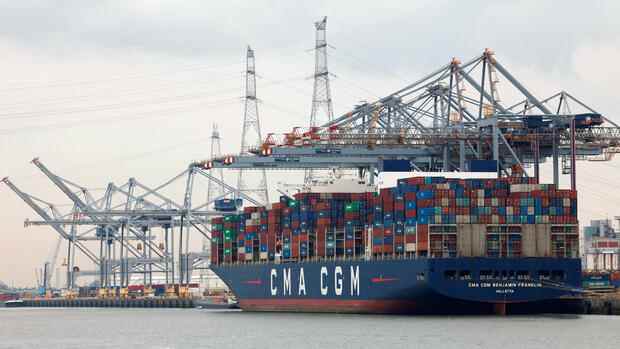The global economy is likely to grow by 3.0 percent this year, but only by 2.2 percent in 2023.
(Photo: Reuters)
Berlin The Russian war of aggression against Ukraine weakens the outlook for the global economy even more than expected. The OECD lowered its forecast for global growth this year to three percent on Monday. For 2023, the industrialized nations organization expects only 2.2 percent. That would be 0.6 percentage points less for next year than expected in June. “The world is paying a high price for Russian aggression in Ukraine,” said OECD Secretary-General Mathias Cormann.
There is also little improvement in sight for inflation. According to the organization, the high energy prices in particular will ensure that inflation will decrease somewhat, but will remain well above the central bank’s target of around two percent.
According to the OECD forecast, the inflation rate in the 20 leading industrialized and emerging countries will be 8.3 percent in 2022. In 2023 it will probably be 6.6 percent. Both values are higher than last expected.
In principle, the OECD does not expect a global recession, as Cormann explained: “But there are enormous downside risks.” The organization counts the risk of even higher food and energy prices, which could drive many people into poverty.
Top jobs of the day
Find the best jobs now and
be notified by email.
Bottlenecks in the gas supply in winter are also mentioned. According to a model calculation by the OECD, European gas storage facilities will be more than 90 percent full by October. But that alone is not enough: Europe can only get through the winter without shortages if gas consumption falls by at least ten percent compared to the previous four years. Otherwise, there would be a gas shortage as early as January 2023 in a cold winter, and in February in a normal winter.
According to the OECD forecast, additional price increases and problems with the gas supply could depress growth by a further 1.25 percentage points in the coming year. This would threaten many countries with a recession for 2023 as a whole.
>> Read here: That is why the high level of gas storage in Germany does not mean the all-clear
The OECD predicts that Germany will not be able to avoid such an economic development even without additional burdens. The Federal Republic is increasingly emerging as a brake on the economy. In no other OECD country has the organization corrected the growth prospects for the current year so far downwards. For 2022, the experts only expect an increase of 1.2 percent, which is almost a third less than the estimate in June.
Next year, the OECD sees Germany slipping into a recession. The economy will then shrink by 0.7 percent. Most recently, the organization had forecast growth of 1.7 percent.
Ifo Institute expects recession
There is increasing evidence that such weak economic development is occurring. The mood in the executive floors of German companies is worse than it has been since the beginning of the corona crisis. The Ifo business climate index fell from 88.6 to 84.3 points in September, the lowest level since May 2020, as the Munich-based Ifo Institute announced on Monday in its survey of around 9,000 executives.
>> Read here: “I make a loss with every roll”: An entrepreneurial country at the limit
Economists had only expected a drop to 87 points. “The German economy is slipping into recession,” said Ifo President Clemens Fuest. “The pessimism with regard to the coming months has increased significantly.” The respondents were even more skeptical about the business situation and prospects than before.
The industry is looking to the next six months with great concern, explained Fuest. “The expectations were last so pessimistic in April 2020.” The mood has deteriorated in almost all sectors.
The entire Ifo index signals more than ever a recession in the winter half-year, emphasized Commerzbank chief economist Jörg Krämer. The energy price shock is causing consumers’ purchasing power to collapse and making the production of many companies unprofitable. “Germany has become poorer due to the massive increase in the price of energy imports,” said Krämer.
High energy costs are increasingly spreading to consumer prices as a whole. The OECD expects an inflation rate of 8.4 percent for Germany in 2022 and then 7.5 percent in 2023. That is 1.2 or 2.8 points more than before. “Inflation will remain high,” said OECD chief economist Alvaro Pereira.
More: Lowest value since 2020: Sentiment in the German economy is deteriorating.
